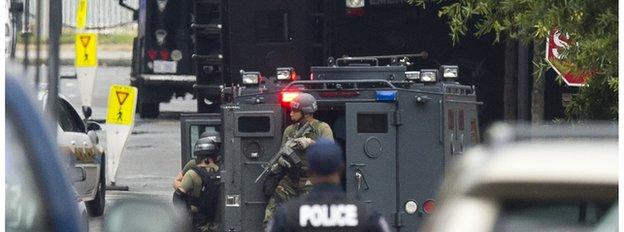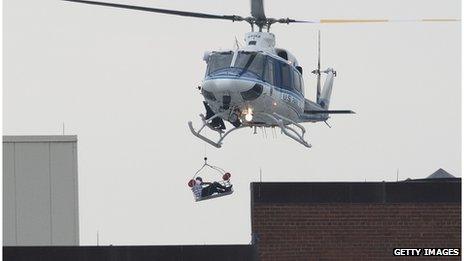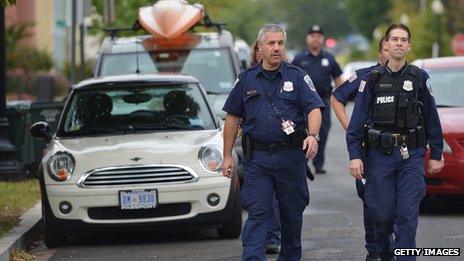Washington Navy Yard shooting: Survivors' ordeals
- Published

Those who escaped Monday's deadly shootings at a US naval facility in Washington DC have been trying to make sense of the violence.
Cmdr Tim Jirus was sitting in an office building at Washington Navy Yard, writing an email to a colleague, when he heard gunfire.
"I thought, 'that doesn't sound like real shots,'" he said. "It sounded like a tap gun - as opposed to a real gun."
As it became clear a gunman was on the loose, Cmdr Jirus and a man he had just met tried to help friends and colleagues out of the building. They were standing outside when two shots rang out.
"One hit him. The other one - it didn't hit me," says Cmdr Jirus. "I looked down. The other guy's dead."
'Heartbreaking'
Police helicopters buzzed above the Navy Yard. Roads were blocked off. Law enforcement officials patrolled pavements, wearing bullet-proof vests emblazoned with the words "police antiterrorism".
A sign written in blue ink was taped on a Starbucks window. It said: "Closed till further notice."

A survivor of the assault is carried away from the building
Greg Heir, 34, whose mother works at Washington Navy Yard, was crouched under a tree at Third and M Street, about a quarter of a mile from the facility.
He was wearing a white t-shirt, jeans and trainers and had a pen stuck behind his ear. He used it to jot down information when friends called him with news about the shootings.
He was at his job, at a tile shop in Manassas, Virginia, when he heard about the attack.
As he jumped in his car and drove to the naval installation, his mother, Margo Partlow, 59, called to say she was inside the building.
"Her office is surrounded by armed guards," said Heir, who has a tattoo that says "Mama's Boy" on his arm.
"She was crying and asking me what was going on. She was asking me to come and get here."
It was "a little heartbreaking", he said.
"She's OK," he said, adding: "It doesn't seem real till it happens to you."
'Shelter in place'
Residents in the surrounding area discussed the shooting, comparing the incident with previous dramas in the city.
Jeff Bowman, sitting on a bench on M Street, recalled the time two decades earlier when he was working at a Washington building where a credit union was robbed.

That was the first time he had heard the phrase, "shelter in place" (it means, stay put), an advisory used by the authorities on Monday as sites were placed on lockdown.
Luckily, these types of incidents are rare. A 2011 US Department of Justice report, external showed that overall workplace violence went down by 35% from 2002-09.
Such statistics will probably provide little comfort to those affected by Monday's rampage. And yet survivors of such mayhem have little choice but to try to move on.
Several hours after the attack, Cmdr Jirus was standing near a metro station on M Street, holding a plastic water bottle. He seemed calm.
"It's my first time in an office shooting," he said.
He politely excused himself from conversation.
"I have to go recycle," Cmdr Jirus said, crunching the bottle. "And I'm hungry."